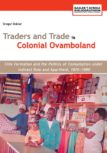Traders and Trade in Colonial Ovamboland, 1925–1990. Elite Formation and the Politics of Consumption under Indirect Rule and Apartheid
- Language: English
- 248 pages
- Illustrations, maps, tables, index
- Vol. 8
- ISSN: 2296-6986
- ISBN:
- Print: 978-3-905758-40-5
- PDF: 978-3-905758-56-6
Traders and Trade in Colonial Ovamboland, 1925–1990. Elite Formation and the Politics of Consumption under Indirect Rule and Apartheid
Taking the history of trade and of traders as its subject matter, this book offers the first economic history of northern Namibia during the twentieth century. It traces Namibia’s way from a rural, largely self-relying society into a globalised economy of consumption. This transformation built on colonial economic activities, but it was crucially shaped by local traders, a new social elite emerging during the 1950s and 1960s.
Becoming a trader was one of the few possibilities for black Namibians to gain monetary income at home. It was a pathway out of migrant labour, to new status in the local society and often to prosperity. Politically, most traders occupied a middle ground: content of their own social position, but intent on political emancipation from colonial rule. Economically, their energy and business acumen transformed northern Namibia into an increasingly urban consumer society. The development path they chose, however, depended too much on the colonial reserve economy to remain sustainable after 1990. Their legacy still shapes spatial and social structures in northern Namibia, but most traders’ businesses have today closed down. By telling the history of the rise and decline of traders and trade in northern Namibia, this book is thus also a reflection on the conundrums of economic development under conditions of structural inequality.
Gregor Dobler is professor for social anthropology at Freiburg University (Germany). He concentrates on economic and political anthropology, often combining long-term participation and archival work. After earlier research in France and the Comoros, he has done extensive fieldwork in northern Namibia since 2003.
Introduction
1 The early years: from itinerant traders to monopoly stores
2 The monopoly stores, 1925-1952
3 The first locally owned stores, 1937-1955
4 From indirect rule to liberation war: Ovamboland 1948-1978
5 Traders in a modernizing society
6 Stores and spatial organization after 1950
7 Taking sides? Traders and politics during the liberation war
Conclusion
Annex

